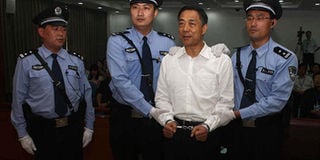Why Africa should borrow a leaf from China in war against graft

Chinese political star Bo Xilai (second right) stands in a courtroom in Jinan after he was convicted of bribery and abuse of power. PHOTO | FILE | AFP
What you need to know:
The Communist Party launched a drive called “catching flies and tigers” years ago.
The party’s Central Committee for Disciplinary Inspection says it has investigated 1.16 million cases and punished 1.2 million people since 2012.
Experts say part of the reason for corruption in Africa is a culture that celebrates impunity.
The growing Chinese influence in Africa should involve fighting corruption, experts now say.
At a summit in Nairobi, participants said much of the problem is in the way governments have allowed diversion of Chinese money to personal pockets.
Dr David Monyae from the University of Johannesburg said it was ironic that 43 per cent of Africans live below poverty line when states have signed on commitments to curb corruption.
“There are perceptions in the West that China-Africa economic relations are marred with corruption,” Dr Monyae said at the conference organised by the Africa Policy Institute.
“This stands on Africa’s development and the belief is that China is to blame because of its non-interference policy which undermines the West’s quest of promoting good governance.”
CORRUPTION
He added that Africa can draw lessons from the way China deals with corruption at home.
The Communist Party launched a drive called “catching flies and tigers” years ago. The party’s Central Committee for Disciplinary Inspection says it has investigated 1.16 million cases and punished 1.2 million people since 2012. At the same time, 57,000 people “confessed” to wrongdoing.
The policy, which critics say has also been used to silence political dissent, barred the use of public funds to buy gifts, organise banquets or other wastage.
But the most controversial policy is the ‘Fox Hunt’ drive which targets fugitives abroad thought to have stolen public money in china.
FUGITIVES CAPTURED
By end of 2017, the panel says, 2,873 fugitives had been captured and returned home.
According the National Statistics Bureau, Chinese corruption watchdogs enjoy an approval rating of 93 per cent.
China is ranked 41 out of 180 countries on the TI corruption index, where 1 is best and 180 is worst. Ironically, six of 10 countries funded by China and which are at the bottom are African.
China is yet to sign up co-operation deals on corruption or even some sort of information-sharing arrangement with African countries.
Experts say part of the reason for corruption in Africa is a culture that celebrates impunity.
POLITICAL INFLUENCE
“Almost every country has anti-corruption agencies. However, the systems are prone to political influence,” Prof George Oreku said.
Recently, China pledged to support African governments fight corruption by setting up an Africa China Law Enforcement and Security Forum.
However, sharing data is only one way. Commitment to fight corruption is another thing.
“One possible area Africa can learn from China is empowerment at regional level in the anti-corruption fight,” Mr Munetsi Madakufamba, the Executive Director of Southern African Research and Documentation Centre, said.
“We need to set aside funds to enhance systems. Lack of resources and slow investigation mechanism are big challenges.”
KICKBACKS
In countries like Kenya where corruption fights back, experts say political will is necessary.
Chinese corporate agents are even accused of giving kickbacks to win tenders.
Chinese Charge d’Affaires in Nairobi Li Xuhang said his country will continue to vouch for “open, inclusive and sustainable development”.
He added that these could be achieved by improving the level of internal security, comprehensive management and creating a convenient business environment.
Mr Mutambo is a Regional News Editor with the Nation.





